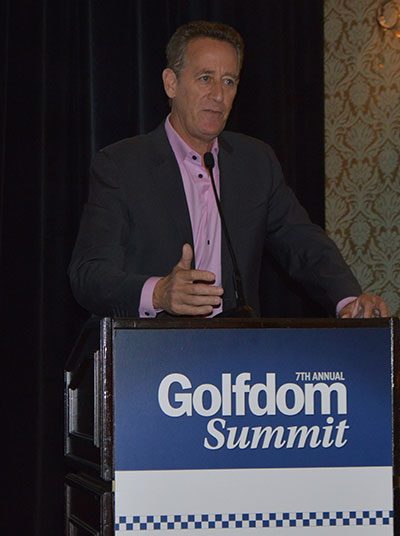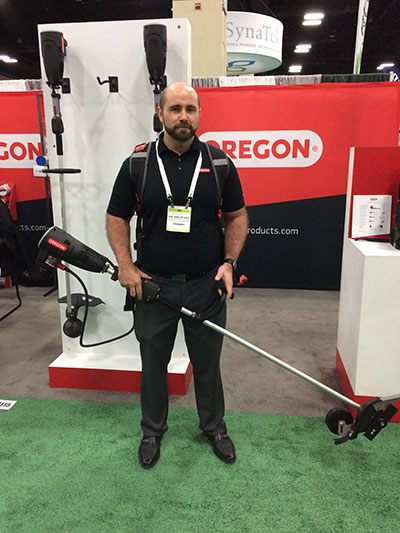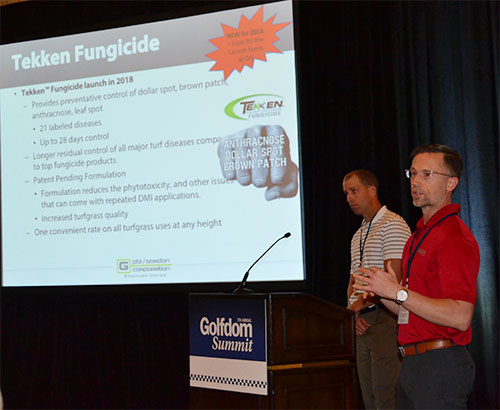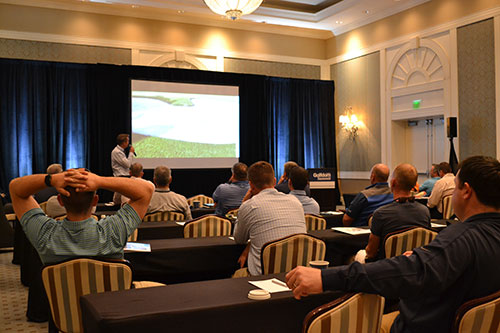Summarizing the Summit

2017 Summit keynote speaker Rich Lerner
Part 2 of our 2017 Golfdom Summit recap has a central theme: “Better conditions with less maintenance.” Read part 1 here.
Ted Fist, head of U.S. business operations for Capillary Concrete, is someone you might consider a “first-time caller, longtime listener” when it comes to the Golfdom Summit. He was aware of it for a long time but participated in the Summit for the first time last year.
He’s now tuned in.
“What’s been great about the Golfdom Summit — unlike a traditional trade show — we get solid one-on-one time to talk directly about our products for a couple minutes,” Fist says. “That doesn’t always happen at a trade show, where it’s more rapid fire — they come into the booth, they leave pretty quickly. (The Summit) gives us an opportunity to have a dialogue that I haven’t found anywhere else in the industry.”
In last month’s cover story, we asked seven of the 15 vendors to give us their “pitch” at the 2017 Summit (we also included a photo of all 70 attendees on our cover). This month, we round out the balance of vendors with interviews of the remaining eight.
Quali-Pro
It’s never a bad thing to travel with the boss.
And the boss of Quali-Pro — Mark Boyd, president and CEO of Control Solutions Inc., which is the parent company of Quali-Pro — attended the Golfdom Summit to meet superintendents in person.
“Because we had Mark Boyd, the president of the company there, a lot of the conversation was around ‘Who is Quali-Pro?’” says Paul Fox, Quali-Pro’s Gulf Coast area manager. “A lot of people aren’t familiar with who we are, so we got to tell our story.”
So, what’s the story? “It’s a family-owned company that started in 1958, and now it’s a part of Adama, one of the largest chemical manufacturers globally,” Fox says. “We not only sell post-patent products, but we also focus on new, value-added differentiated products like Nimitz, Taurus and Enclave.”
Fox says that beyond the “Who is Quali-Pro” conversation, the chemical solutions conversation depended on where the superintendent is based. He did say that Nimitz, their nematicide, is doing well and being sold in a large geographic area.
“There’s no doubt that over the last several years, nematodes were considered a coastal/southern issue,” Fox says. “But we’re selling product all over the place. Places in Kansas, in Missouri, all over the North, where nematodes historically were not thought to be an issue… they’ve found that they are.”
Oregon Outdoor Power Equipment

At GIS 2018, Oregon’s Joe Amalfitano demonstrated a backpack battery-powered trimmer, one of the many products of interest at the Summit.
If there was one product that was turning heads at the Oregon demo area, it was their blower, according to Joe Amalfitano, North American business development manager for the company.
“When you talk in terms of commercial-grade blowers, ours is going to put out 22 newtons worth of blow force,” Amalfitano says. “To give you an idea, that’s mid-range or a step above a mid-range gas blower.”
Benefits of the blower include sound reduction — at full throttle, it produces 59 decibels; the ingest protection — the blower can ingest water and simply blow it out; and it’s emissions free.
Amalfitano was happy to meet with a group of superintendents from around the country. He says superintendents are seeing battery-powered equipment as a more viable option for maintenance operations.
“At the end of the day, a two-cycle blower has its drawbacks; it’s noisy, messy, has down time and gas issues can lead to spills and damage to the course,” he says. “The driver for golf is, ‘How do I get away from (gas) and become a greener company, and can I still function the way I have been without the traditional drawbacks of battery… which is less power, less run time, less performance?’ Oregon pretty much answers and checks all those boxes.”
PBI-Gordon

PBI-Gordon’s Jim Goodrich (right) and Jay Young give attendees the rundown on Tekken, a new broad-spectrum fungicide.
“We want to make sure that whatever the golf course superintendent is looking for, we’re bringing the right thing to the market,” says PBI-Gordon’s Jim Goodrich, product manager, fungicides, insecticides and plant growth regulators. “We have a seemingly endless supply of active ingredients, so we want to make sure the things we have in the pipeline are what’s going to help them with their problems.”
Goodrich and his crew took advantage of their time at the Golfdom Summit and asked one simple question to every attendee: “What are your needs?”
The company’s new Tekken broad-spectrum fungicide was frequently discussed, even though it wasn’t available at the time (it became available last month.) Goodrich was prepared, telling attendees that Tekkencontrols 21 problematic diseases, uses two modes of action, delivers control for up to 28 days and is applied at one rate for all turfgrasses, eliminating guesswork.
“In the development process, we were looking for a product that highlighted our new active ingredient, Isofetamid,” Goodrich says. “We wanted to team it with something to broaden the spectrum. We put into motion a series of products… Tekken rose to the top. It has a unique formulation that is doing wonderful things on creeping bentgrass fairways and creeping bentgrass greens and other grasses, where it doesn’t have the same effect that higher-load DMI products have.”
Capillary Concrete

Golfdom columnist Joe Gulotti (center), of Newark (Del.) CC, talks about his bunker challenges with Capillary Concrete’s Martin Sternberg, CGCS (left) and Rusty McLendon.
This was the first Golfdom Summit for bunker company Capillary Concrete. The company brought the heavy hitters in Martin Sternberg, CGCS, CEO and founder, and Ted Fist, head of U.S. business operations.
Fist says that once a superintendent sat down with the duo, they explained the highlights of their product — that it is a homogenous blended product delivered in a ready-mix truck and installed in a one-step process. It goes in a bunker, is covered in 2 inches of sand and is ready to be played the next day.
“It drains at hundreds of inches an hour,” Fist says. “We’re looking at water, moisture content and how that relationship with the sand and our gravel layer and the drainage system interact… so we can provide better playing conditions with less maintenance.”
Fist says a highlight of the event for him, aside from meeting such a talented group of superintendents, was when one of their meetings ended and another was about to begin. Fist says the previous superintendent stopped the incoming superintendent. “He tells the other guy he’s not going to use anyone else but us — he’s talking about our product and selling for us!” Fist laughs. “That’s when I knew our message was getting through.”
Primera
Primera gave a unique pitch to superintendents at the 2017 Summit. “We told these guys right away, we’re not going to sell you anything,” says Rocky Dreibrodt, director of Corbin Turf, a Primera distributor.
Instead of pitching products, the company wanted to find out what superintendents look for in a distribution representative, and to educate them on their company. Primera is a distribution network cooperative spanning 61 companies and 525 distribution sites throughout the United States. It works with a range of manufacturers, including big names such as Syngenta, Bayer and Dow.
Michael Kropp, national director of professional markets for Wilbur-Ellis, another Primera distributor, says, “We do about $650-700 million dollars in sales, and that buying power helps us provide the best products, the best pricing and the best service that we can as a co-op.”
Communication with sales reps was a hot topic in the one-on-one meetings. Though many younger superintendents prefer to interact with their reps via text and the old-school crowd tends to prefer phone calls, they had one thing in common. “They all have to have trust that I’m going to stand behind the products,” Dreibrodt says.
Fortunately for Primera, it seems that they’re building trust while also growing the company. Kropp notes that the co-op went from 9 percent market share in 2011 to 22 percent market share in 2016.
“We’ve had tremendous success the last six years,” says Dreibrodt. “This allows us to continue to tell people who we are and keep us relevant, because we don’t want to rest.”
Healthy Grow
Who knew that chickens could help grow high quality turf?
Pearl Valley Organix is a family owned poultry farm in Illinois that manufactures Healthy Grow, an organic fertilizer made from the waste of egg-laying chickens on the farm. The waste is then mixed with organic materials and turned into fertilizer through a 45-day aerobic composting process.
According to Healthy Grow, the natural timed-release fertilizer helps grow healthy, disease-resistant turf without flush growth, which cuts back on mowing.
Jeff Leuzinger, Healthy Grow’s sales manager, explains, “We’re a manufacturer that makes a granular organic fertilizer from start to finish. From producing the manure to composting to granulation. We do it all and we have control over every process, up to when you open your bag.”
Healthy Grow has been a Golfdom Summit partner since 2013, and it looks forward to the event every year as an opportunity to learn more from superintendents about their practices and the products they use. This year, the company wanted to “get more detail on the superintendent’s program because everyone is a little different,” says Leuzinger. “We have a conversation and then we get superintendents to try our product, and for us that’s what we feel we need. Once they try our product they’re going to like it.”
Textron Golf

The boardroom presentations gave superintendents a first look at each of the partners’ products and programs, and a chance to digest that information before their meetings.
There was plenty to talk about at Textron Golf, especially since the company encompasses several golf brands. Jeff Barrett, Textron’s regional director of sales, says, “We recently integrated the Jacobsen product into our portfolio. Now we’ve got an umbrella of three brands — E-Z-Go, the Cushman brand and now Jacobsen.”
At the Summit, the company focused on Cushman and Jacobsen products and how those brands are being integrated under Textron and presented to the marketplace.
“A lot of our feedback has been about our technology,” Barrett says. “We’ve got the Eclipse mower in the Jacobsen line; that’s superior cutting quality in the industry.” Attendees were also able to demo the main star of Textron’s show, the Cushman Hauler Pro electric vehicle.
Cushman underwent a redesign for the Hauler Pro, which focused on feedback from superintendents. Updates include the 72-volt AC system and a more functional dash with expanded storage, because superintendents use their vehicles every day as their office on the course.
The Textron team has seen reception to their equipment evolve over the six years they’ve been a Summit partner. “We used to have to talk a lot about the (Hauler Pro), and now that transition has been ‘Talk to your peers,’” says Barrett. “There’s enough folks here who have utilized the product, and now we’ve got that reference point close by.”
WinField United
Between topdressers, GPS sprayers, electric power equipment and rollers, there was plenty of action on the ground during the Summit — but you had to look up to catch WinField United’s
demonstration.
Powered by drone imagery,WinField United’s GeoTech platform is a facility manage-ment tool that also aggregates GPS data from satellites and airplanes. The WinField team demonstrated the GeoTech’s capabilities by surveying via drone the conditions on Reunion Resort’s driving range and analyzing the health of the turf, while also providing a look at the platform’s interface.
“(GeoTech) takes data, consolidates it and provides insights to improve or develop agronomic plans,” explains John Smith, WinField United’s director of marketing. “The tool has five years of satellite imagery that can be incorporated in those plans. We take all these layers and create individual zones, which can then be incorporated into a variable-rate sprayer or manually incorporated into a superintendent’s agronomic practice.”
Aside from the drone data, the GeoTech tool also can incorporate information from other sources, such as TDR Soil Moisture Meter, Pogo Turf Pro or NDVI (normalized differentiation vegetation index) data to monitor turf health.
“These guys are really interested in new innovations in technology happening right now,” Smith observes. “Many of them have seen it in the ag space, and now that it’s coming to turf they’re interested in where it’s going and how they can best take advantage of it on their individual properties.”
Photos: Abby Hart, Grant Gannon, Ed Hiscock








